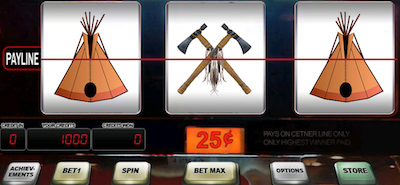Earlier this year I wrote an article that highlighted the dispute between the Seminole Indians and the state of Florida surrounding banked card games and slot machines that emulated banked games, like blackjack and Baccarat.
In the article, I indicated that the Indian Gaming Regulation Act of 1988 was causing a rift between many states and Indian Tribes as the two sides argue over revenues and area exclusivity. The Act was intended to give Native groups the opportunity to become self sufficient and rely less on government handouts by providing a revenue stream centred on gambling. Most Tribes already offer bingo and poker, so this was a way to regulate and legitimize the activity and, in turn, states were given a percentage of the take from the Tribal casinos as well. The only requirement in most states was that the Indian Tribes had to reach a compact with the state. In Florida, the Seminole Indians signed a 20 year compact in 2010 which gave the Seminoles the exclusive right to offer slot machines outside of South Florida and the authorization to offer banked card games at their casinos until July 31, 2015. At that point, it was expected a new compact relating to banked card games would be made, either extending the rights to the Seminoles or ending them.
Florida's governor believed he had a deal in place prior to July 2015 that would have continued the exclusive rights to the Seminoles for banked card games in exchange for almost $300 million in revenue, but the Florida Senate balked. Several communities wanted the ability to offer banked card games at horse and dog racing tracks and voted accordingly and many in the Senate believed it was unfair to deny them this opportunity. So, the compact ran out without a vote and the Senate immediately demanded that the Tribes cease offering banked card games at their casinos since the compact expired. The Seminoles continued to offer the games and decided to sue the state claiming that Florida violated the terms of the compact by allowing player banked card games at racetracks throughout the state and slot machines that emulated banked card games at the casinos in South Florida.
 Player banked card games are effectively the same as any banked card game except instead of the house taking in the losing bets, a "designated player" at the table is deemed to be the bank and gets the winnings. In effect, it's like Pai Gow poker where every other turn a player gets a right to be the bank. Of course, the house still takes their cut of the losses in Pai Gow Poker and it would be assumed it's the same here. And in the case of card game emulated slot machines, anyone who has attended a casino in the United States or Canada has likely seen them. They have screens with an apparently "live dealer" handing out cards and players bet in a manner similar to how they would at an actual table. Upon first inspection, they appear to be real live dealer games until you realize the same woman dealing the cards at the blackjack machine is the same one dealing cards at 4-card poker machines and at the Let It Ride machines, yet somehow, she has a different outfit on at each of the machines and different facial expressions at each one. So, it is just a slot machine that looks like a live dealer table.
Player banked card games are effectively the same as any banked card game except instead of the house taking in the losing bets, a "designated player" at the table is deemed to be the bank and gets the winnings. In effect, it's like Pai Gow poker where every other turn a player gets a right to be the bank. Of course, the house still takes their cut of the losses in Pai Gow Poker and it would be assumed it's the same here. And in the case of card game emulated slot machines, anyone who has attended a casino in the United States or Canada has likely seen them. They have screens with an apparently "live dealer" handing out cards and players bet in a manner similar to how they would at an actual table. Upon first inspection, they appear to be real live dealer games until you realize the same woman dealing the cards at the blackjack machine is the same one dealing cards at 4-card poker machines and at the Let It Ride machines, yet somehow, she has a different outfit on at each of the machines and different facial expressions at each one. So, it is just a slot machine that looks like a live dealer table.
In turn, Florida sued the Seminoles, saying that they were violating the law by continuing to offer banked card games at their casino after the compact expired. The judge in the case ruled for the Seminoles claiming that the player banked card games were a blatant violation of the agreement and ordered that the Seminoles had the right to exclusive rights to bank card games until 2030 when the compact ends. For their part, the Seminoles decided to reach a new deal with the state over revenues despite the fact the ruling may have dictated they didn't have to. In July, the Seminoles agreed to pay the state $340 million (by releasing the amount that was being held in escrow until a ruling was made) and the Tribe will renew the amounts it is paying to the state until 2030. Naturally, not everyone is happy.
Miami-Dade wanted to put up a large non-Seminole casino, which because of this new agreement may not be feasible and the smaller counties that were relying on new gambling ventures to boost interest in horse and dog racing are now left out in the cold. The state likely will try to work out something with the Seminoles, though that will allow this, although it appears the Seminoles are prepared to stick it out realizing that exclusivity is their biggest asset. But cities like Jacksonville, Tampa and Miami surely feel like they were kicked in the gut.
Another state that is fighting with their Tribe is New York. In 2002 the Seneca Nation of Indians signed a compact with the state of New York which gave them exclusive rights to certain parts of Western New York, including Buffalo and Niagara Falls. The Seneca Indians put up three casinos, including one in downtown Buffalo, a resort style casino near the Canadian border in Niagara Falls and one in Salamanca. The decision by the state was in response to Ontario building a large resort casino in Niagara Falls, Ontario and it was believed this was the only way to save the American side which was losing tourists to Canada. While the casino in Niagara Falls has been successful, it has done little to help the surrounding area which is still in disrepair. In fact, it has been indicated that few people that go to that casino stay on the U.S. side of the border. The casino attracts a lot of Canadians who cross the border to gamble in the U.S., but then return to Canada. While the two Ontario casinos in Niagara Falls are glitzier and larger than the American casino, two major attractions of the New York casino are the ability to receive free alcoholic beverages and the ability to smoke. Ontario law prohibits the serving of alcohol for free and all public venues in Ontario must be smoke free. One Ontario resident who frequents the casinos in Niagara Falls and Buffalo told me that the ability to smoke is paramount to him.
"If I'm on a roll at the blackjack table, the last thing I want to do is have to put down a marker, leave and go outside or into a designated smoking area. The American casinos have non-smoking areas and that should be sufficient. We're all over 21 and it's not right that I should have to avoid something that's legal just to appease the nanny state. With the Seneca casinos, I control what I want to do and that includes the right to light up one of my Rothmans (a Philip Morris, Canadian cigarette brand) or get a free Tom Collins."
The Seneca compact provided that the casino would provide a portion of the revenue back to the state who, in turn, would provide the cities a percentage of that revenue (a sort of hosting fee). The Seneca Indians stated that the compact ran out in 2016 and as a result have halted payments to the state, but Governor Andrew Cuomo has argued that the Senecas are still required to provide the state revenue. The Seneca Indians disagreed and have made it abundantly clear that they will continue to provide funds to the cities as "a good neighbor", but will not pay anything more to the state. And the Seneca Indians have indeed been very good neighbors, continuing to provide revenue to the cities and partnering with them on efforts to attract people. In fact, in Buffalo there is currently a huge advertising campaign funded by the Seneca Casinos which is geared to surrounding cities, including Ontario cities like Toronto and Hamilton, suggesting that Buffalo is a great place to visit. The ad starts out "when you think about Buffalo do you think of rust and snow?" The ad then tries to tell people to go there and experience the Buffalo you don't know. One Toronto residents I spoke to about the ad said it is the definition of trying to put lipstick on a pig and the only real reason to go to Buffalo is for cross border shopping or to get cheaper U.S. flights than from Toronto. Aesthetically Buffalo offers nothing. Suprisingly, it has been working, as apparently tourism in Buffalo has risen this year.
Adding to the frustration of the Seneca Indians is the decision by the state to put up casinos in neighboring communities where the Seneca Indians do not have exclusive rights and the decision by New York to work with other Tribes. A few years back the state agreed to allow Buffalo Downs, located in Hamburg, New York and Batavia Downs, located in Batavia, New York to put in slot machines. The Seneca Indians argued that these facilities were in their jurisdiction, particularly Buffalo raceway and it was not the right of the state to allow them. But the state contended that Hamburg is not in the exclusive zone. Consequently, the Seneca Indians withheld payments to the state from 2009 to 2013, but the two sides worked out a memorandum of understanding in 2013, where apparently the state agreed to halt any further developments without consulting the Seneca Indians first. They also allowed the casinos to keep the money they would have paid to the state for those 4 years. It's uncertain if the cities were paid their share. But the state has continued to expand and begun working with the Oneida Nation of the Thames (a Canadian bank located near Niagara Falls) and the St. Regis band of Mohawks (located in Eastern New York) for the ability to build casinos there. And most recently the state authorized the Del Lago Resort and Casino in Waterloo, near Seneca Lake in the Finger Lakes. The Seneca Indians contend that this is too close to their area and should not be allowed, although it is outside their exclusive zone. The state disagrees.
In the meantime, the cities which rely on the money, particularly Salamanca, are left in limbo, while the state and Tribes fight and now they are wondering how they will balance their budgets if the Seneca Indians stop paying. The Seneca Indians have indicated they will give the cities funds, but since the process has always been as a payment by the state to the city it's unsure how this will work.
The last state that is fighting with the Indian groups is California. California is unique since there are so many different Tribes (244 to be exact, including 75 tribal compacts) and each one must come to an agreement not only with the state, but with themselves. The infighting in California over online poker and casinos is well documented. Some Tribes want a bad actor clause, which would exclude companies like PokerStars from operating in California, while others don't seem to care. Some Tribes want to expand casino offerings to the Internet, while others want everything to remain land-based only at existing casinos. Some Tribes are prepared to work with the horse racing industry while others still balk. And the list goes on.
This infighting has caused several government bills to be stalled and the state and Tribes really seem no closer to a deal with online poker today than in previous years. And in July California Assemblyman Adam Gray introduced a bill that would legalize sports betting in California. It seems almost sure to pass in the legislature but it must be passed by the Tribes as well and that apparently is going to be a major sticking point. Tribal lawyers argue that even if it could be ratified by all Tribes (which is almost impossible), this new form of gambling could violate compacts, which would make things more complicated. And while most Tribes are looking for any means to increase revenues (by law all gambling revenues must go to the Tribes, who in turn pay the states a percentage of the revenue), there are a lot of Tribes that oppose gambling and will block any form of gambling expansion. In the meantime, the ones who lose out are the cities and consequently their residents. One analyst who has been frustrated with the situation in California for years explained:
"California is broke. They are desperate for revenue and this is a no brainer. Californians continue to gamble offshore, with illegal bookmakers and in unauthorized poker games. The states and Tribes get nothing from it. This is a way to bring much of that money back to the state. The Tribes will get the funds, distribute their fair portion to the state who can allot the money to cities to pay for health care, infrastructure, education and even to battle the wildfires that are consuming parts of the state right now. But if the money isn't coming in then the cities and similarly citizens don't benefit. It's fine for the states and Tribes to bicker about revenue agreements, exclusivity rights and philosophical issues but that doesn't pay the bills. Meanwhile, California residents get bigger and bigger tax bills and services fall by the wayside. It's a no win for anyone."
While Florida, New York and California are the three obvious states where disagreements between the states and Tribes are causing a rift there is also some infighting in Michigan, Oklahoma and Connecticut.
In the end, this is all about people. Whether its residents of Akwesasne or Buffalo, people rely on their respective government leaders to come up with a plan that will help them with their day to day needs. Gambling is an easy way to raise revenues to pay for the basic needs of a state or Indian reserve and at some point, both sides must swallow their pride and look out for the interests of the people and cities that put them in charge. Unfortunately, as the states and Tribes fight, the cities and consequently the general population loses out.
Read insights from Hartley Henderson every week here at OSGA and check out Hartley's RUMOR MILL!






































